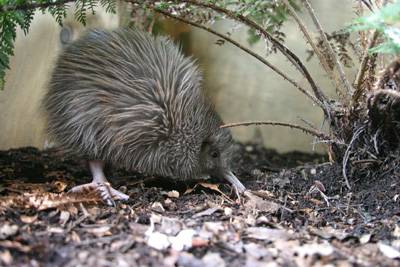Kiwi Making Home in Dunedin

Kiwi Making Home in Dunedin
The eight young kiwi released into Orokonui Ecosanctuary on November appear to be checking out their new home in the wildlife haven, says Orokonui's trust board chairman, Neville Peat.
The kiwi, all from the critically endangered Haast tokoeka variety of South Westland, were released into makeshift burrows at several locations in the Ecosanctuary with transmitters attached to their legs. The translocation involved the Department of Conservation and two runanga – Makaawhio from South Westland, who are the cultural guardians of tokoeka, and the local people, Kati Huirapa ki Puketeraki, of Karitane. Including the Ecosanctuary, the four parties signed a memorandum on Saturday covering each party's responsibilities.
'Our conservation manager, Elton Smith, has been monitoring the kiwi after dark," Neville Peat said today. 'Some of them have begun moving around the forest. Elton has heard calls and even seen one of the kiwi on a walking track. For many decades now the kiwi's call has been a shrill cry for help and now Dunedin is coming to the aid of our national bird through offering a safe breeding area at Orokonui.
'These first eight kiwi have the length of a 2 km-long forested valley in which to make their home – that's plenty of room.
'We envisage night excursions for the public after the settling-in period, and what a novel experience it will be for Dunedin people to be able to hear kiwi calls. It's astonishing to think that our national bird – and the rarest kind at that – has returned to the wild in the Dunedin area after an absence of over 130 years," Mr Peat said.
For more information about Orokonui visit www.orokonui.org.nz
Photo: Paul Wilson / Kiwi Birdlife Park, Queenstown
MORE





